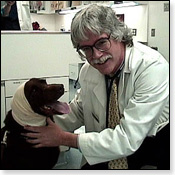Animal Radio® Show #422 January 5, 2008
"Three Dog Night" - Sleeping
With Your Pet
 The term "three dog night"
originates with the Inuit tribes of Alaska, who measured nocturnal
temperatures based on how many of their sled dogs they needed
to bring indoors to serve as bed warmers. And, especially at this
time of the year, not only do we want to keep warm, but our pets
want to keep warm as well.
The term "three dog night"
originates with the Inuit tribes of Alaska, who measured nocturnal
temperatures based on how many of their sled dogs they needed
to bring indoors to serve as bed warmers. And, especially at this
time of the year, not only do we want to keep warm, but our pets
want to keep warm as well.
A recent Adweek study revealed, of the
63% of households that own a pet, the majority (88%) viewed that
pet as part of the family, and 69% allowed their pet to sleep
in bed with them.
It seems that everyone we speak with has stated that at one time
or another their pet has slept in the bed with them. But if they
have a spouse, how did that spouse feel about the sleeping arrangement?
 Animal Radio® discussed this
problem with world-renown psychiatrist, Dr. Joyce Brothers, who
feels that pets can easily come between partners when they don't
agree on sleeping arrangements. In fact, she mentions that divorce
frequently is the result.
Animal Radio® discussed this
problem with world-renown psychiatrist, Dr. Joyce Brothers, who
feels that pets can easily come between partners when they don't
agree on sleeping arrangements. In fact, she mentions that divorce
frequently is the result.
This is also a worldwide issue. Animal Radio® hosts Hal Abrams
and Judy Francis had a chance to meet Brian and Kaye Pickering,
their Aussie counterparts on Pet Talk Radio. Since they have four
dogs, Judy asked them what their sleeping arrangements were. They
state that they "rotate" their dogs, allowing one in
bed at a time, as four would be too much at once.
Animal Radio® listeners speak-out on how they cope with this
problem. One couple has actually worked out a compromise. The
husband's dog is "technically" not allowed in bed, but
when he sneaks in at 4:00 am, the wife turns the other cheek.
She states, "Sometimes you just have to pick your battles!"
If you would like to tell Animal Radio® how you keep the peace
in bed, call toll-free 866-405-8405 or email yourvoice@animalradio.com.
Hear more "Letting your pets into bed" this week on
Animal Radio®
http://AnimalRadio.com/422PODCAST.mp3
Dogs Detect Cancer in Patients' Breath
Britt Savage
 Recent studies by Pine Street Foundation,
a cancer research organization in San Anselmo, California shows
that a dog can smell a human's breath and detect if that person
has cancer.
Recent studies by Pine Street Foundation,
a cancer research organization in San Anselmo, California shows
that a dog can smell a human's breath and detect if that person
has cancer.
In fact, with only a few weeks of training,
most household dogs can learn to tell the difference between breath
samples of healthy people or those with lung and breast cancer.
The earlier cancer is detected, the better
chance someone has of surviving cancer. And now, researchers are
hoping that man's best friend, dog, can help with early screening
and detection.
NEWS UPDATE: More Wills Make Provisions
for Pets
 When Mama
is gone, who will take care of Baby? Laura Souza no longer has
to ask that question. Four years ago when Laura adopted Baby Nino,
an Eclectus parrot that lives to 70, she had her attorney write
her will so that unless her daughter takes care of her bird, she
will not inherit the estate.
When Mama
is gone, who will take care of Baby? Laura Souza no longer has
to ask that question. Four years ago when Laura adopted Baby Nino,
an Eclectus parrot that lives to 70, she had her attorney write
her will so that unless her daughter takes care of her bird, she
will not inherit the estate.
Pet trusts are becoming more and more
common now that laws have been passed making them legal. Typically,
when someone lists an animal in their will, they will leave around
$10,000 to $35,000 for the care of the animal. With the exception,
of course, with Leona Helmsley who left $12 million dollars to
her dog Trouble. Most people don't have that kind of money!
As with Leona Helmsley, elderly owners
who live alone are more inclined to set up pet trusts. They could
also be irritated with their children because they don't call
or visit, or just because they love their animals so much.
But if you don't have someone you trust,
there is a place you can turn to. Pet retirement homes are a new
option. The Stevenson Companion Animal Life-Care Center in Texas,
is one of those options. They currently has about 320 animals
from 18 different states at their facility, and for about $50,00
you can enroll your pet, who will be taken care of for the rest
of their life.
 NEWS
UPDATE Brought To You By Simple Solution Natural Line Of Products
NEWS
UPDATE Brought To You By Simple Solution Natural Line Of Products
Kevin Fitzgerald "Emergency
Vets"
When Puppy Gets into Things He Shouldn't
 Everyone's
heard about plants such as poinsettias being bad for your dog,
but did you know that Macadamia nuts are toxic and can produce
devastating neurological results?
Everyone's
heard about plants such as poinsettias being bad for your dog,
but did you know that Macadamia nuts are toxic and can produce
devastating neurological results?
And what do you do when your puppy gets into your medicine on
your nightstand? Also, do you think your dog will be fine if he
swallows a few pennies? Beware, the zinc in pennies can destroy
a dog's red blood cells.
Dr. Fitzgerald has great information regarding these subjects
and many more. If you have a dog you don't want to miss
this!
http://www.AlamedaEast.com
 Talk With
Your Animals
Talk With
Your Animals
Joy Turner
Joy speaks with Booger who wants
to remain a semi-feral cat, and have the best of both worlds -
who wouldn't!
http://www.TalkWithYourAnimals.com
http://www.JoyTurner.com
 Lobster
Lobster
Rae Ann Kumelos, Voice of the
Animal
Who is graced with the most fanciful
names in all of the Seven Seas, is the inspiration for a spaceship's
telescope, and catches the eye of the Poet Laureate? Lobster:
much more than just a cantankerous crustacean.
http://www.VoiceOfTheAnimal.org
The $2,000 Hamster
Britt Savage
 We all know
at times that pets can be expensive, but a $2,000 hamster? A family
was on a road trip with their hamster when they noticed he was
missing. After a thorough search, the saddened family thought
that the hamster had simply escaped from the car.
We all know
at times that pets can be expensive, but a $2,000 hamster? A family
was on a road trip with their hamster when they noticed he was
missing. After a thorough search, the saddened family thought
that the hamster had simply escaped from the car.
Miles later, when the car was taken to
a mechanic to find out why the car wouldn't start, the mechanic
found that the hamster had not only chewed it's way through the
seats, but had also done a great damage to the wiring.
Even though the repairs were about $2,000,
the family was relieved to have their hamster back.
Animal E.R. Ready When You Need
Them!
Dr. Jim Humphries, Veterinary
News Network
 Cold weather,
holiday food, toxins and injuries can cause our pets serious problems
this time of year. Thankfully, animal emergency rooms are now
common. Staffed by highly trained team members and loaded with
high-tech equipment, it might be difficult to distinguish the
animal ER from your local human hospital.
Cold weather,
holiday food, toxins and injuries can cause our pets serious problems
this time of year. Thankfully, animal emergency rooms are now
common. Staffed by highly trained team members and loaded with
high-tech equipment, it might be difficult to distinguish the
animal ER from your local human hospital.
http://www.myvnn.com
Listen to the
entire Podcast of this show (#422).
 Listen to Animal Radio® - Go to the launch page
Listen to Animal Radio® - Go to the launch page
 Return to Animal
Radio Network™ Home Page
Return to Animal
Radio Network™ Home Page
 Read
January Newsletter
Read
January Newsletter
Copyright 2008 All Rights
Reserved Animal Radio Network LLC
 The term "three dog night"
originates with the Inuit tribes of Alaska, who measured nocturnal
temperatures based on how many of their sled dogs they needed
to bring indoors to serve as bed warmers. And, especially at this
time of the year, not only do we want to keep warm, but our pets
want to keep warm as well.
The term "three dog night"
originates with the Inuit tribes of Alaska, who measured nocturnal
temperatures based on how many of their sled dogs they needed
to bring indoors to serve as bed warmers. And, especially at this
time of the year, not only do we want to keep warm, but our pets
want to keep warm as well. Animal Radio® discussed this
problem with world-renown psychiatrist, Dr. Joyce Brothers, who
feels that pets can easily come between partners when they don't
agree on sleeping arrangements. In fact, she mentions that divorce
frequently is the result.
Animal Radio® discussed this
problem with world-renown psychiatrist, Dr. Joyce Brothers, who
feels that pets can easily come between partners when they don't
agree on sleeping arrangements. In fact, she mentions that divorce
frequently is the result. Recent studies by Pine Street Foundation,
a cancer research organization in San Anselmo, California shows
that a dog can smell a human's breath and detect if that person
has cancer.
Recent studies by Pine Street Foundation,
a cancer research organization in San Anselmo, California shows
that a dog can smell a human's breath and detect if that person
has cancer. When Mama
is gone, who will take care of Baby? Laura Souza no longer has
to ask that question. Four years ago when Laura adopted Baby Nino,
an Eclectus parrot that lives to 70, she had her attorney write
her will so that unless her daughter takes care of her bird, she
will not inherit the estate.
When Mama
is gone, who will take care of Baby? Laura Souza no longer has
to ask that question. Four years ago when Laura adopted Baby Nino,
an Eclectus parrot that lives to 70, she had her attorney write
her will so that unless her daughter takes care of her bird, she
will not inherit the estate. NEWS
UPDATE Brought To You By
NEWS
UPDATE Brought To You By  Everyone's
heard about plants such as poinsettias being bad for your dog,
but did you know that Macadamia nuts are toxic and can produce
devastating neurological results?
Everyone's
heard about plants such as poinsettias being bad for your dog,
but did you know that Macadamia nuts are toxic and can produce
devastating neurological results?  Talk With
Your Animals
Talk With
Your Animals  Lobster
Lobster We all know
at times that pets can be expensive, but a $2,000 hamster? A family
was on a road trip with their hamster when they noticed he was
missing. After a thorough search, the saddened family thought
that the hamster had simply escaped from the car.
We all know
at times that pets can be expensive, but a $2,000 hamster? A family
was on a road trip with their hamster when they noticed he was
missing. After a thorough search, the saddened family thought
that the hamster had simply escaped from the car. Cold weather,
holiday food, toxins and injuries can cause our pets serious problems
this time of year. Thankfully, animal emergency rooms are now
common. Staffed by highly trained team members and loaded with
high-tech equipment, it might be difficult to distinguish the
animal ER from your local human hospital.
Cold weather,
holiday food, toxins and injuries can cause our pets serious problems
this time of year. Thankfully, animal emergency rooms are now
common. Staffed by highly trained team members and loaded with
high-tech equipment, it might be difficult to distinguish the
animal ER from your local human hospital.